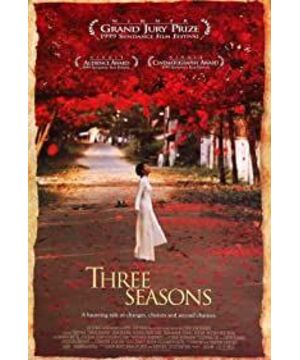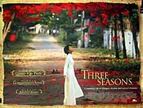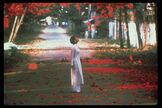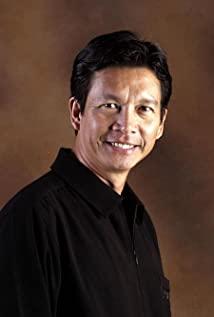Because my father works in Vietnam, I occasionally follow him to visit there. When you first arrive in Vietnam, everything is new. The imitation French buildings are lined up, bud yellow, pink and sky blue, like the castle where the princess lives in a fairy tale; the towering billboards at the crossroads are particularly eye-catching, without the barbaric stacking of various elements, revealing the Western design techniques. , that is simple and direct; the sun is indiscriminately scorching the streets where people come and go, the bronze skin is mixed with sweat and glowing with metallic luster; street vendors stand by the stand up cold drink stalls, watching I passed by. Maybe friends who have been to Vietnam, especially those who have lived in Bashan and Shushui for a long time like me, are deeply impressed by the exotic customs in front of them. But not many people know about the history of Vietnam. For more than a thousand years, parts of Vietnam were ruled by China. After the Five Dynasties and Ten Kingdoms and the great chaos in the Central Plains, Vietnam broke away from China and became a vassal state of China. (The vassal state can be understood as a vassal state or a semi-colony). In the Qing Dynasty, Vietnam became a French colony. In 1945, Ho Chi Minh declared the establishment of the Democratic Republic of Vietnam, and Vietnam has sovereignty since then. To commemorate Ho Chi Minh, the Vietnamese people renamed Saigon to Ho Chi Minh City to this day. When it comes to the Vietnamese people I have come into contact with, Ah Chen is one of them. Ah Zhan's family was my father's neighbors when he first came to Vietnam. Ah Zhan has not had a father since he was a child, and he does not know who his father is. In those turbulent times, A-Zhan's mother raised her daughter alone, and her life was inexorable. As for who her biological father was, it might not matter anymore. It was not until Ah Zhan dropped out of school and went to work in a Japanese factory that his life improved slightly. Knowing that it was my first time in Vietnam, Ah Zhan came straight to my house after get off work. She can speak a little Chinese and English, I can speak a little English, and with body language, we can barely communicate. You remembered her warm smile, without any grudges, as if they had hit it off at first sight. After chatting happily, she offered to take me on a motorcycle and take me around the city. Along the way, countless motorcycles flashed past our ears. I knew that she was deliberately controlling the speed of the car. I was dragging her clothes tightly. She clearly knew the nervousness I showed. She took me to a temple fair, watched an open-air performance in a middle school, and had supper with an old classmate who was still studying in college. For the first time, I realized that smiles are enough to replace words, and it's good to talk without words. When I asked to go to the mall, she said she had never been there because that's where the rich and foreigners go, and grimaced at me. So I followed her to a supermarket, and there were many T-shirts scattered in the shelves in the corner of the supermarket. It's a girl, Seeing so many clothes, her eyes flashed, she lifted them up one by one, put them on her body, and put them down one by one, until she finally put them down completely. After getting acquainted, she told me that she didn't like local men, and she didn't want to get married like most Vietnamese women. And I am learning Chinese, and I hope to go to Guangxi, China for development in the future. In the era of no wifi and no wechat, this foreign friendship came to an abrupt end when I returned to China. But I always remember her affectionate smile. Some days have not been to Vietnam. It wasn't until recently that I watched a Vietnamese movie "Three Seasons" that reminded me of her, and the laugh that I remember vividly. Title "Three Seasons of Love" Seasons) Chinese translation is very poetic, but it is easy for people to misunderstand that it is a romance film, but it is actually a deconstruction of human nature. With this film, Vietnamese director Bao Toni was nominated for the "Golden Bear Award" at the Berlin International Film Festival. It is a rare masterpiece in Vietnamese movies, and it is also his debut. The director uses a montage technique to present the stories of three different characters, and the three stories are independent of each other. But it's not as simple as we thought. The three characters seem to be different, but they all come from the bottom of the society; the three characters seem to have not participated in each other's lives, but they have had a brief intersection, but they are just passers-by that are not worth mentioning each other. The first rainy season. The little boy Udi lost the sales box he depended on and was kicked out of the house. The ruthless rainstorm, the embarrassing life, and the violent adoptive father drove him to a desperate situation in life. I am afraid that the parents who see this plot are all worried about it. Udi didn't cry because life had taught him that crying couldn't solve any problems. He tried his best to find all kinds of clues to find the box, but still found nothing. But he was not at a loss. He imitated the scenes in the movie and entertained himself; he met a homeless girl to keep each other warm; he played football with his friends in the rain and recklessly enjoyed the thrill of shooting. He still smiled like a child. You thought he had no hope of finding the box, but inadvertently found it in play. He has never despaired of life, and life is still his hope. The second dry season. The interpretation is the story of the mountain biker A Hai who uses his sincerity to influence the prostitute Lian. The identity of a prostitute is low, but the screenwriter gave her a chaste name, which is in contrast to her identity, which shows her intentions. Ah Hai can't control so much, he believes that the prostitute in front of him is just a lost lamb. It is better to teach a man to fish than to give him a fish. He wants to make Lian reborn. He used the prize money of the tricycle competition to buy Lian's night. He didn't do mortal things, but let Lian experience the true love and warmth that he had not seen for a long time. In the last scene, when Lian changed into a white Ao Dai, faded her heavy makeup, and stood under a tree with scattered phoenix flowers, she became the first appearance of a girl. Her smile is beautiful. In fact, the lotus hasn't changed, but the attentive Ah Hai has long seen the real lotus, just like a blooming lotus, white and flawless. The third season is the season when the lotus blooms. The lotus is the national flower of Vietnam. Symbolizes purity and hope. This season tells the story of a lotus-picking woman and the poet Mr. Du. One rich and one poor, one disabled and one healthy, one dying and one just in their youth. Originally two people who were incompatible, but by chance, the spark of life collided. This relationship is not love, but a rare friendship. I think Mr. Du who is terminally ill is lucky, at least in the last moment of his life , met someone who knew him. As he chanted in his poem: "The moonlight is so pale, I'm afraid it can't cover the dark lake, I still find joy, although I am in pain. I see a rainbow in the withered clouds, and my thoughts jump on the paper. , like a finger on a string. I plucked hastily, and a light is plucked, and the melody echoes in my anguished heart." They have only met three times. From seeing each other at first sight, to seeing each other again, and finally saying goodbye at the end of the day. Emotions are progressive. The final sublimation is that after Mr. Du's death, he entrusted all the manuscripts in his life to the lotus girl. This kind of trust is no less than that of the emperor. At the end, the lotus-picking girl started the same lotus-picking life again, as if the past with Mr. Du was calm. But you can clearly see the lotus girl smiling calmly in the camera. Trust and understanding are rare treasures. The three stories begin with a lotus flower and end with a lotus flower. The director intends to imply that the audience can appreciate the opening and closing of life through the opening and closing of lotus flowers. In fact, the screenwriter laid a foreshadowing in Mr. Du's poem, which can interpret the essence of the whole film. "I don't care about the shroud on my body, the sky of the prison cell, the dull predicament, when I come to the lake, I would like to be a lotus flower, spreading fragrance and poetry all over the world. I pursue my style in the wind, and I find that today's life is still Wonderful."
View more about Three Seasons reviews









